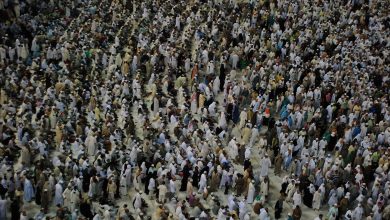The Significance and History of Hajj in Islam

Hajj is the annual pilgrimage to Mecca, Saudi Arabia, that is considered one of the Five Pillars of Islam, along with the declaration of faith, prayer, charity, and fasting. It is a mandatory religious duty for Muslims who are physically and financially able to make the journey at least once in their lifetime.
The Hajj takes place during the Islamic month of Dhu al-Hijjah, which is the twelfth month of the Islamic lunar calendar. The pilgrimage involves a series of rituals that are performed in and around the city of Mecca, including the circumambulation of the Kaaba, a large black cube-shaped structure located in the center of the Masjid al-Haram, the largest mosque in the world.
The Hajj is a time of spiritual reflection and renewal, as well as a time for Muslims from around the world to come together in unity and brotherhood. It is a challenging journey, both physically and spiritually, and requires a great deal of preparation and planning. Many Muslims consider the Hajj to be one of the most significant experiences of their lives.
The Five Pillars of Islam are the fundamental religious obligations that are mandatory for all Muslims. These pillars provide the framework for a Muslim’s daily life, guiding them in their spiritual, social, and moral responsibilities. One of these pillars is the Hajj, which is considered to be one of the most significant acts of worship in Islam.
The Five Pillars of Islam are:
- Shahada (Declaration of Faith): This is the declaration that there is no god but Allah, and that Muhammad is his messenger. It is the most fundamental belief in Islam.
- Salah (Prayer): Muslims are required to pray five times a day, facing towards Mecca. This is a way for Muslims to connect with Allah and show their devotion.
- Zakat (Charity): Muslims are obligated to give a portion of their wealth to those in need, as a way to purify their wealth and help those who are less fortunate.
- Sawm (Fasting): During the holy month of Ramadan, Muslims are required to fast from sunrise to sunset. This is a way for Muslims to practice self-discipline and focus on spiritual matters.
- Hajj (Pilgrimage to Mecca): Muslims who are physically and financially able to do so are required to make a pilgrimage to Mecca at least once in their lifetime. This is a way for Muslims to connect with their faith and join millions of other believers in performing the same rituals.
What is the Hajj?
- The Hajj is a pilgrimage to the city of Mecca in Saudi Arabia, which is considered one of the Five Pillars of Islam. It is a mandatory religious duty for all adult Muslims who are physically and financially able to perform it at least once in their lifetime. The Hajj is a significant event in the life of a Muslim, as it is a way for them to deepen their faith, seek forgiveness for their sins, and renew their commitment to Allah.
- The origin of the Hajj dates back to the time of the Prophet Ibrahim (Abraham in the Bible). It is believed that Allah commanded Ibrahim to leave his wife, Hajar (Hagar in the Bible), and their son, Ismail (Ishmael in the Bible), in the desert near the Kaaba, which was the first house of worship built for Allah. Ibrahim later returned to Mecca with his son and together they rebuilt the Kaaba as a place of monotheistic worship. The Hajj rituals are based on the actions of Ibrahim and his family.
- The Hajj rituals are performed over five days, beginning on the 8th day of Dhu al-Hijjah, the 12th month of the Islamic lunar calendar. The key rituals include:
- Ihram: Pilgrims enter a state of purity and consecration by performing a specific ablution and wearing two white pieces of cloth. They also make the intention to perform the Hajj.
- Tawaf: Pilgrims circle the Kaaba seven times, while reciting prayers and touching or kissing the Black Stone, which is believed to have been given to Ibrahim by the angel Gabriel.
- Sa’i: Pilgrims walk between the hills of Safa and Marwa seven times, in commemoration of Hajar’s search for water for her son Ismail.
- Wuquf: Pilgrims spend a day in the plain of Arafat, where they engage in prayer and contemplation, seeking forgiveness for their sins and making supplications to Allah.
- Stoning of the Devil: Pilgrims throw pebbles at three pillars, representing the temptation of Satan, in Mina.
- Eid al-Adha: The Hajj concludes with the celebration of Eid al-Adha, which commemorates Ibrahim’s willingness to sacrifice his son Ismail, and the subsequent provision of a ram by Allah as a substitute.
- To perform the Hajj, Muslims must meet certain requirements and eligibility criteria, including being of sound mind, having reached the age of puberty, being physically and financially able to make the journey, and being free from any outstanding debts or obligations. Women must be accompanied by a male relative or travel in a group of women. The Hajj is a highly regulated event, with strict guidelines and procedures in place to ensure the safety and well-being of all pilgrims.
Importance of the Hajj as the Fifth Pillar of Islam
- The Hajj is considered the Fifth Pillar of Islam and holds great importance in the Islamic faith. Here are some reasons why:
- Worship and Devotion: The Hajj is a form of worship and devotion to Allah, as Muslims make the journey to Mecca with the intention of performing the rituals solely for the sake of Allah. It is considered one of the most virtuous acts that a Muslim can undertake.
- Spiritual Purification and Renewal: The Hajj is also seen as a means of spiritual purification and renewal. Muslims engage in acts of worship and contemplation during the Hajj, seeking forgiveness for their sins and making supplications to Allah for blessings and guidance.
- Unity and Brotherhood: The Hajj is a demonstration of unity and brotherhood among Muslims, as people from all over the world, regardless of race, nationality, or social status, come together to perform the same rituals. It serves as a reminder that all Muslims are equal in the eyes of Allah and that they share a common bond of faith.
- Reminder of the Afterlife: The Hajj is also seen as a reminder of the Day of Judgment and the afterlife. The physical journey of the Hajj, with its challenges and hardships, serves as a metaphor for the spiritual journey of life and the ultimate journey towards Allah. It reminds Muslims of their mortality and the importance of leading a virtuous life in preparation for the afterlife.
- In summary, the Hajj is an important pillar of Islam that serves as a form of worship and devotion, a means of spiritual purification and renewal, a demonstration of unity and brotherhood, and a reminder of the afterlife. It is a highly significant event in the life of a Muslim and is considered a once-in-a-lifetime opportunity to deepen one’s faith and seek the blessings of Allah.
Conclusion
The Hajj is one of the Five Pillars of Islam, a mandatory religious duty for all adult Muslims who are physically and financially able to perform it at least once in their lifetime. It is a pilgrimage to the city of Mecca in Saudi Arabia and holds great importance in the Islamic faith. The Hajj is a form of worship and devotion, a means of spiritual purification and renewal, a demonstration of unity and brotherhood, and a reminder of the afterlife. Muslims who perform the Hajj have the opportunity to deepen their faith, seek forgiveness for their sins, and renew their commitment to Allah. The Hajj is a highly regulated event, with strict guidelines and procedures in place to ensure the safety and well-being of all pilgrims.
For More intreasying content visit: https://articleinon.com/



